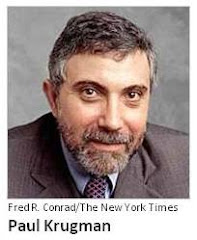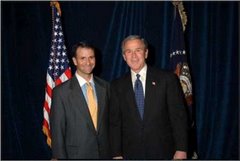 "It has a strong flavor of the Obama philosophy, which is tilting the playing field away from upper income and toward the rest of America,"
"It has a strong flavor of the Obama philosophy, which is tilting the playing field away from upper income and toward the rest of America,"Alice M. Rivlin, Brookings Institution Economist
Take a look at President Obama's new budget for 2010. It reflects many of the President's campaign promises and issues that he has always maintained were important to him. In it are funds for education (particularly higher education) and energy, and, lo an behold, science is BACK.
"The blueprint, meanwhile, would overhaul programs across the federal bureaucracy to strengthen assistance for millions of people who have borne the consequences of what Obama called "an era of profound irresponsibility," helping them pay for college, train for better jobs and save for retirement while taking less of their earnings in taxes.
The ambitious agenda for the fiscal year that begins in October would not come cheap. This year's budget deficit, swollen by spending to combat a severe recession, would hit a record $1.75 trillion, or 12.3 percent of the overall economy, under the president's plan, the highest since 1945. While Obama inherited the bulk of that gap, his budget would make room for a fresh round of spending that could hit $750 billion to prop up troubled financial institutions.
Next year's deficit would approach $1.2 trillion. But Obama proposes to cut that figure roughly in half by the end of his first term, in large part by levying nearly $1 trillion in new taxes over the next decade on the nation's highest earners, defined as families with gross income of more than $250,000 a year."
NYTimes, February 27, 2009
Here are a few highlights taken directly from the budget 2010:
Dept of Education - Funding Highlights:
• Creates incentives and supports for States to build comprehensive, coordinated, high-quality early childhood “Zero to Five” systems, building on the early childhood investments in the American Recovery and Reinvestment Act of 2009.
• Strengthens and reforms public schools to meet the needs of all students, by helping States to develop high quality, rigorous standards and assessments, vigorously supporting and rewarding effective teaching, and investing in and widely disseminating effective approaches to improving student achievement to help all students make progress toward high standards.
• Expands opportunities for students to go to college and graduate by expanding student aid, shifting resources from banks and middlemen toward students, creating new incentives for colleges to focus on student completion, and expanding access to low-cost Federal student loans.
Dept of Energy - Funding Highlights:
• Begins to build a new economy that is powered by clean and secure energy through funding provided in the 2010 Budget and the $39 billion provided for energy programs in the American Recovery and Reinvestment Act of 2009.
• Provides significant increases in funding for basic research and world-leading scientific user facilities to support transformational discoveries and accelerate solutions to our Nation’s most pressing problems – including the development of clean energy.
• Supports economic investment and positions the United States as the world leader in climate change technology.
• Accelerates the transition to a low-carbon economy through increased support of the development and deployment of clean energy technologies such as solar, biomass, geothermal, wind, and low-carbon emission coal power.
• Builds on the $11 billion provided in the Recovery Act for smart grid technologies, transmission system expansion and upgrades, and other investments to modernize and enhance the electric transmission infrastructure to improve energy efficiency and reliability.
• Supports and encourages the early commercial deployment of innovative, clean energy technologies through loan guarantees.
• Reduces security risks through the detection, elimination, and securing of nuclear material and radiological sources worldwide while maintaining the safety, security, and reliability of the nuclear weapons stockpile.
• Continues the Nation’s efforts to reduce environmental risks and safely manage nuclear materials.
Investment in the Sciences:
As part of the President’s plan to double Federal investment in the basic sciences, the 2010 Budget, along with the $1.6 billion provided in the recovery Act for the Department of Energy’s basic science programs, provides substantially increased support for the Office of Science. The Budget increases funding for improving our understanding of climate science and continues the United States’ commitment to international science and energy experiments. The Budget also expands graduate fellowship programs that will train students in critical energy-related fields. Encourages the Early Commercial use of New, innovative Energy Technologies that will Reduce Greenhouse Gas Emissions.
Dept of Education - Funding Highlights:
• Creates incentives and supports for States to build comprehensive, coordinated, high-quality early childhood “Zero to Five” systems, building on the early childhood investments in the American Recovery and Reinvestment Act of 2009.
• Strengthens and reforms public schools to meet the needs of all students, by helping States to develop high quality, rigorous standards and assessments, vigorously supporting and rewarding effective teaching, and investing in and widely disseminating effective approaches to improving student achievement to help all students make progress toward high standards.
• Expands opportunities for students to go to college and graduate by expanding student aid, shifting resources from banks and middlemen toward students, creating new incentives for colleges to focus on student completion, and expanding access to low-cost Federal student loans.
Dept of Energy - Funding Highlights:
• Begins to build a new economy that is powered by clean and secure energy through funding provided in the 2010 Budget and the $39 billion provided for energy programs in the American Recovery and Reinvestment Act of 2009.
• Provides significant increases in funding for basic research and world-leading scientific user facilities to support transformational discoveries and accelerate solutions to our Nation’s most pressing problems – including the development of clean energy.
• Supports economic investment and positions the United States as the world leader in climate change technology.
• Accelerates the transition to a low-carbon economy through increased support of the development and deployment of clean energy technologies such as solar, biomass, geothermal, wind, and low-carbon emission coal power.
• Builds on the $11 billion provided in the Recovery Act for smart grid technologies, transmission system expansion and upgrades, and other investments to modernize and enhance the electric transmission infrastructure to improve energy efficiency and reliability.
• Supports and encourages the early commercial deployment of innovative, clean energy technologies through loan guarantees.
• Reduces security risks through the detection, elimination, and securing of nuclear material and radiological sources worldwide while maintaining the safety, security, and reliability of the nuclear weapons stockpile.
• Continues the Nation’s efforts to reduce environmental risks and safely manage nuclear materials.
Investment in the Sciences:
As part of the President’s plan to double Federal investment in the basic sciences, the 2010 Budget, along with the $1.6 billion provided in the recovery Act for the Department of Energy’s basic science programs, provides substantially increased support for the Office of Science. The Budget increases funding for improving our understanding of climate science and continues the United States’ commitment to international science and energy experiments. The Budget also expands graduate fellowship programs that will train students in critical energy-related fields. Encourages the Early Commercial use of New, innovative Energy Technologies that will Reduce Greenhouse Gas Emissions.
And now for an explanation of the headline for this post namely the phrase "president savant," (Savant - from the French savant "knowing", English since the 18th century - may refer to an expert or wise person) it seems to me that never before in the history of this country have we had a person who was more uniquely qualified and more uniquely in tune with what this country is hungry for. This fact stands in stark contrast to the past eight years as we were led (sic) by a true idiot (nothing wise about dubya), in a direction that a grim majority of the U.S. population finally saw as wrong (only 17% of the country approved of Bush's handling of the economy during the final year of his presidency). Now we have a true leader, a human being, a man of color who believes with his heart and his head that the gap between the ultra-rich and the very poor is something of which this nation should be ashamed and which this country needs to address post haste. He has proposed a budget that does just that, a budget that begins to even out the playing field, a budget that begins to address some of the glaring inequalities that have marked the policy of Washington D.C. insiders since the era of Ronald Reagan.
"Our problems are rooted in past mistakes, not our capacity for future greatness. We should never forget that our workers are more innovative and industrious than any on earth. Our universities are still the envy of the world. We are still home to the most brilliant minds, the most creative entrepreneurs, and the most advanced technology and innovation that history has ever known. And we are still the Nation that has overcome great fears and improbable odds. It will take time, but we can bring change to America. We can rebuild that lost trust and confidence. We can restore opportunity and prosperity. And we can bring about a new sense of responsibility among Americans from every walk of life and from every corner of the country."

































































No comments:
Post a Comment